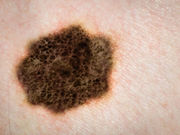Elevation in Th17.1 cells prior to administration of PD-1 checkpoint tx, onset of symptomatic sarcoidosis
MONDAY, May 15, 2017 (HealthDay News) — There is an association between the presence of abnormally high numbers of circulating Th17.1 cells in melanoma patients prior to receiving anti-programmed cell death (PD)-1 antibody therapy and the onset of sarcoidosis, according to research published online May 8 in the International Journal of Rheumatic Diseases.
Anna J. Lomax, M.B.B.S., from the Chris O’Brien Lifehouse in Camperdown, Australia, and colleagues present a case series of melanoma patients who developed immunotherapy-induced sarcoidosis. Biopsy-proven sarcoidosis was identified in three patients with melanoma treated with anti-programmed cell death (PD)-1 antibody therapy at two institutions. Mass cytometry was used to determine expression of the relevant chemokine receptors by peripheral blood mononuclear cells for two of the three patients who developed sarcoidosis and 13 melanoma patients who did not develop sarcoidosis.
The researchers found that in five of the 15 melanoma patients, including both patients who developed sarcoidosis during the course of therapy, immunophenotypic analysis showed that there were abnormally high numbers of circulating Th17.1 cells before initiation of PD-1 checkpoint inhibitor therapy.
“Our findings support prior literature implicating Th17.1 cells in the pathogenesis of sarcoidosis. However, we demonstrate these findings in patients with melanoma prior to administration of checkpoint therapy and before the onset of clinically symptomatic sarcoidosis,” the authors write. “The identification of elevated Th17.1 cells in melanoma patients who have not developed sarcoidosis may reflect the established association between melanoma and sarcoidosis.”
Copyright © 2017 HealthDay. All rights reserved.








